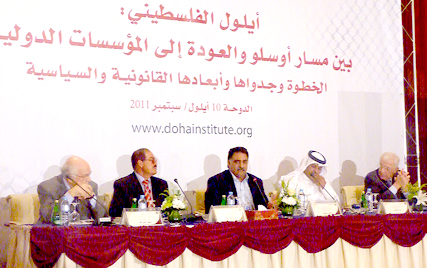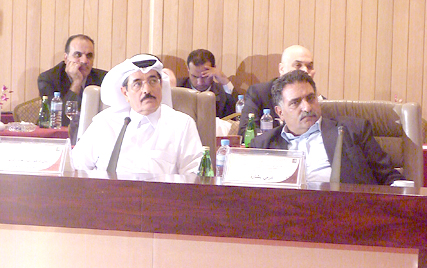At an ACRPS Conference:
The General Director of the Arab Center for Research and Policy Studies (ACRPS), Dr Azmi Bishara predicted, at a conference held on September 10, 2011, that the Palestinian cause would play an increasingly large role in the policies of Arab countries in the aftermath of the Arab revolutions.
This prediction he made during his opening remarks to the conference entitled "The Palestinian September: From the Oslo to a Return to International Institutions; Legal and Political Ramifications".
Speaking at the conference, Bishara described the Palestinian cause as being "central and existential" to the Arab national psyche; now that the Arab peoples had been freed from the yoke of their despot leaders, he said, the Palestinian cause would become one of the major demands which they would continue to hold dear, regardless of the outcome of the Palestinian statehood bid and UN recognition at the United Nations in September.
The conference, which brought together a select number of researchers and scholars of Palestinian descent from various Arab countries, was also notable for the attendance of a number of Arab dignitaries, including Qatari Minister of Culture Hamad Ben Abdulaziz Al Qawari, as well as Egypt and Iraq Ambassadors to Qatar, alongside with the Palestinian Ambassador.
Bishara pointed out that while the Palestinian cause had seemingly stepped into second place on the agenda of Arab media outlets, given the blizzard of activity surrounding the Arab revolutions; yet the Palestinian cause continued to play a central role amongst the Arab people.
One of the few commonalities shared by all the Arab peoples now rebelling was their distaste for how their governments failed to deal properly with the Palestinian cause, and have not managed to secure the Palestinians' rights.
Bishara also predicted that the Palestinian issue would return to the forefront of Arab demands, as soon as the revolutions achieved their aims and freed their countries from tyranny. This had already begun to happen in Tunisia and Egypt, according to Bishara, where the people were now free to express their opinions.
ACRPS General Director Bishara also indicated that the Center's desire to set aside a special conference for the topic of Palestinian statehood was a result of the ACRPS' concern for all aspects related to the Palestinian cause, not as a political position but since it is no longer considered of primary importance as noticed in the Arab and the international media landscapes.
The Palestinian leadership's attempt to form a fully-fledged Palestinian state was an important maneuver, which needed to be explored in further depth; something which, according to Bishara, Arab think-tanks had thus far failed to do.
Commenting directly on the decision of the Palestinian National Authority, the body brought about by the Oslo Agreements to govern the Palestinian territories (the PNA), to approach the United Nations, Dr Bishara said: "I believe that that this move by the PNA to approach the United Nations has demonstrated how the bi-lateral negotiations between the Palestinians and the Israelis through the Oslo process for the past 18 years, have failed. This is what has forced the Palestinians to return to international institutions; this renewed path with all its legal and political aspects will be examined at length through the conference."
Closing his remarks, Bishara noted that many people were projecting their own political views onto the Palestinian statehood bid, and also raised a number of questions regarding the political repercussions of such move. Will it be better for the Palestinians to try to win stake their claim at the UN General Assembly, or through the UN Security Council? The statehood bid also left open some questions about the right of return.
Political Engineering, or a Shot in the Dark?
 The first session picked up where Dr Bishara left off. Participants wondered if the way the statehood bid was handled would change the significance of the Palestinian cause on the world stage? What would be the value of a state with incomplete membership of the United Nations? What would be the implications for this on the legal standing of the negotiations, and what legal aspects would there be to Israel's unilateral actions? How would the PNA deal with the possibility of a US veto at the Security Council to prevent the full recognition of a Palestinian state?
The first session picked up where Dr Bishara left off. Participants wondered if the way the statehood bid was handled would change the significance of the Palestinian cause on the world stage? What would be the value of a state with incomplete membership of the United Nations? What would be the implications for this on the legal standing of the negotiations, and what legal aspects would there be to Israel's unilateral actions? How would the PNA deal with the possibility of a US veto at the Security Council to prevent the full recognition of a Palestinian state?
The participants also attempted to arrive at solutions to the questions about how the bid to seek recognition of a Palestinian state at the United Nations would represent a turning point in the negotiations with Israel, or would instead form the beginning to an alternative to the negotiations.
Further, the participants questions how the move to demand recognition of a state would impact inter-Palestinian reconciliation, as well as raising the issue of genuine Palestinian independence, given the reliance of the PNA on foreign funding and its weakness in the face of the actual Israeli occupation.
The first session, chaired by Mr Ali Thufairi, saw the presentation of a number of different points of view, representing a variety of opinion on the issue of the United Nations bid. Dr Anis Fawzi, for example, was of the view that the bid was an adventurous "shot in the dark", and that it was the result of an individual initiative on the part of Mahmoud Abbas and perhaps some of his advisers, without the proper consultation of the bodies in which sovereignty over Palestine lies.
Dr Kamal Al Astal, on the other hand, felt that the desire to seek UN recognition of a Palestinian state resulted from the realization on the part of the Palestinian leadership that the negotiations process has reached an impasse; Astal regarded the move as an excellent example of "political engineering", as it now places Israel in bend.
On another front, Dr Aniz Fawzi Kassem examined the issue from a legal perspective, namely from an international law perspective, and sought to answer questions regarding international law and the statehood bid. Kassem mentioned the many, real factors which could un-do the recognition of a Palestinian state, including, for example, the absence of full sovereignty over Palestinian territory; Kassem also mentioned the many stumbling blocks to the full realization of the dream, mentioning the determination of the United States of America to gather nine Security Council votes out of the fifteen members against the Palestinian statehood bid, which would allow them to avoid using a veto.
Kassem also addressed some of the legal solutions which the Palestinian Authority had at its disposal to achieve its aims, but also spoke of his fears about the limitations of the statehood bid and that, even should it succeed, it might not go much further, in a tangible sense, from the 1988 declaration of statehood made by Yasser Arafat from Algiers.
While a number of countries have recognized a state of Palestine in some shape or another, this has not really moved much beyond the observer status granted to the PLO within the United Nations since 1974, and which grants it the right of being the sole, legitimate representative of the Palestinian people.
These discussions gave rise to a vigorous debate amongst the attendees, in particular the Palestinian Ambassador to Doha, Mounir Ghannam. Ghannam made clear his view that the step which had been taken only after "careful consideration and wide consultations".
Choices and Impacts
 During the second session, chaired by Dr Bassem Sarhan, Alain Gresh spoke of the development of PLO positions and the evolution of its strategy with regards to solving the Palestinian question. This step, he claimed, was a return of its previous policy of seeking redress through international organizations.
During the second session, chaired by Dr Bassem Sarhan, Alain Gresh spoke of the development of PLO positions and the evolution of its strategy with regards to solving the Palestinian question. This step, he claimed, was a return of its previous policy of seeking redress through international organizations.
Dr Sari Hanafi, on the other hand, spoke of the impact which a resort to the United Nations would have on the right of return of Palestinian refugees, making special reference to the suffering of Palestinian refugees in Lebanon, who faced remarkable suffering in pursuit of their basic rights.
Hanafi spoke of the possibility of presenting creative and innovative solutions to the refugee crisis, including the possibility of forming a [Palestinian] state which would grant citizenship to those refugees not resident on its territory.
Dr. Mahmoud Muhareb, presented a research paper titled "Israel and the Palestinian Initiative at the United Nations", in which he addressed the possible unilateral actions which the Israelis might take in response to any increased sense of isolation on its part; the Israelis felt, according to Muhareb, that they were increasingly being compared to the Apartheid regime of South Africa, and worried that their special relationship with the United States might suffer.
Muhareb pointed to the possible reactions of the Israelis, including a potential withholding of tax revenues to the Palestinian Authority, the restriction of movement of the Palestinian leadership or the re-conquest of territories which are now in the control of the Palestinian Authority.
Dr Ala Bayoumi also addressed the conference with a paper titled "The Position of the American Jewish Lobby on the Question of International Recognition [of a Palestinian State]". Bayoumi mentioned how this lobby had worked, since the PNA made its intention to seek UN recognition clear, to use the media to pressure the US administration to oppose the move, in a bid to abort it.
Bayoumi also made clear that this the position of the Jewish lobby in the United States was not undivided, as there are portions of the political right which believed that the conflict would be resolved only through the use of force, which would, eventually, see Israel triumph. While there was a trend in the US political system which believed in the need for the existence of a peace process, others would follow Netanyahu wherever he led.
In its closing session, the conference saw an extensive debate on the part of the audience, a debate which took in the various choices facing the Palestinian National Authority, and whether it would be best to seek recognition in the Security Council versus the General Assembly. In the end, no definite answer was reached.